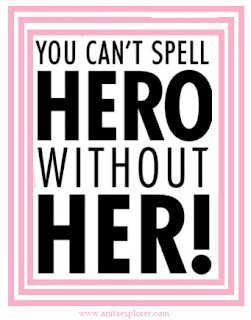On March 8th, we observe “International Women's Day” worldwide.
Apart from Mother's Day that is celebrated in May, this is one day to celebrate women.
Multi-Tasker
and Balancer
A woman balances various roles at home and at work. Just
like the Dashabhuja (ten-armed) Goddess
Durga, she is a multi-tasker. Every woman is expected to be a super-woman.
Even
if she is a working-woman, she is supposed to handle everything- right from
cooking, laundry, childcare, grocery shopping…
If she is a stay-at-home mother
or “housewife”, she is looked down upon. House-work is never a paid activity and it is not
taken into consideration to calculate GDP.
Liability
and Second-class citizens
When a girl is born, she is considered a “liability”
and entire family starts saving for her wedding. The aim is to get her married
as soon as she attains marriageable-age.
A woman is not just a property- an item to be bought or owned or
used or exchanged or given away. Is she “Lakshmi” (the goddess of wealth)? Her in-laws demand and get a hefty dowry from her parents during marriage.
Who cares about her dreams or independence?
In many families, women are treated as
second-class citizens.
Agriculture and handicrafts employ the maximum
number of citizens in our nation. Though there are so many women farmers and
artisans/weavers, their identities and voices remain suppressed. The
male-member, who earns money, is considered superior.
Representation of women in politics, government,
and in corporate organisations is also less.
Leader,
but expected to be Follower
Whatever she does, she
is judged and her work is scrutinized.
She is conditioned to
think- “Log kya kahengey/sochenge?” – What will
people say/think?
Society expects her to
be caring and soft-spoken and keep her opinions to herself.
If she comes across as honest,
opinionated, and independent, she is disliked.
If she is successful in
her profession, she is accused to have adopted “smart” means viz. keeping male
bosses “happy”.
If she takes tough
decisions for the family, company, state or nation, and exhibits her leadership
qualities, thereby making others “follow” her idea/advocacy, men have a problem acknowledging
that she is a leader. Why is it assumed that only men can be leaders?
Charlotte Whitton had rightly said-
'Whatever women do they must do twice as well as men to be thought half as good. Luckily, this is not difficult.'
A woman’s
hard-work is shamelessly usurped by men, who get to ultimately hog the
limelight being projected as the heroes of every story! And such injustice is
supported by other men and women, who despite knowing the real “hero”, chose to
stay silent about the contribution of the deserving woman-leader or achiever.






